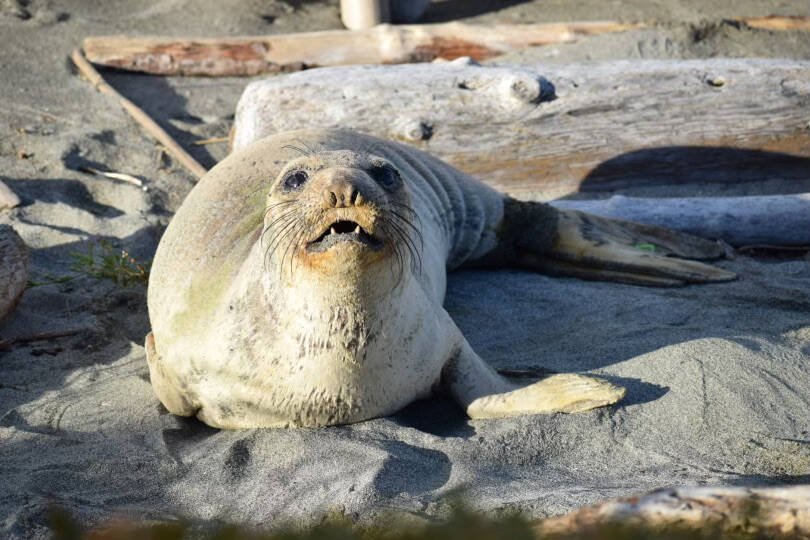The sighting of a Northern elephant seal on a beach in Mutiny Bay last week caused something of a stir, even though she didn’t stick around for long.
On Wednesday evening, a Whidbey resident sent a photo of the pinniped to Garry Heinrich, volunteer coordinator for the Central Puget Sound Marine Mammal Stranding Network. The next day, he went out to check on the seal, which turned out to be a healthy, two-year-old female.
“It was a Thanksgiving gift,” Heinrich said.
Perhaps sensing that it was a day for celebrating over the carcasses of butchered animals, the seal skedaddled soon after she was spotted.
“Pretty much as we were standing there, she decided she didn’t want to be bothered and went back into the water,” Heinrich said.
Female elephant seals can grow to about 10 feet in length and weigh between 900 and 1,700 pounds with an average life span of 20 years.
A green tag indicated that she was from Año Nuevo State Park in California and not from the family of E-named elephant seals that have been spotted frequently on Whidbey Island. So “you can call her whatever you want,” Heinrich said with a laugh.
The Island County Sheriff’s Office got involved in the matter, posting to social media on Thanksgiving Day about the visiting seal. Heinrich explained that he and the sheriff’s office were concerned the seal may have been beginning to molt, a process which can take five weeks. If that was the case, they wanted to warn people about coming too close to her. Federal law requires that people and their pets keep a minimum distance of 150 feet from seals.
“We were worried that she might go back into the water and come back out at another location on Mutiny Bay,” Heinrich said. “But we have heard nothing since that day, which is a good thing.”
According to the Central Puget Sound Marine Mammal Stranding Network, all elephant seals go through an annual molt, referred to as a “catastrophic molt.” During this process, they lose their old fur and much of their skin before growing a pristine new fur coat. They prefer to rest on the beach while this happens. Their nose and eyes may look runny and their breathing will sound labored, but this is all normal.
Elephant seals are polygamous, living in large colonies of females and pups governed by a large mature bull known as the “harem master.” Down in California, they congregate in massive numbers, but that isn’t something typically seen in the Pacific Northwest. However, Heinrich said he learned from an expert with the National Oceanic and Atmospheric Administration that something – whether warmer waters or another factor – might be driving more of the population north, which could explain the Thanksgiving Day visitor to Mutiny Bay.
“Any sighting of any elephant seal, we’d really like to know,” Heinrich said.
In addition, the Central Puget Sound Marine Mammal Stranding Network is also working to track the three generations of elephant seals – Ellie, Eloise, Ellison, Elsie Mae, Elwood and Emerson – that have all visited Whidbey Island at one point or another. Some, like Eloise and Elwood, have not been seen since 2021. Sightings can be reported by emailing Heinrich at garryh@orcanetwork.org or by calling 949-233-2822 and leaving a detailed voicemail message.



